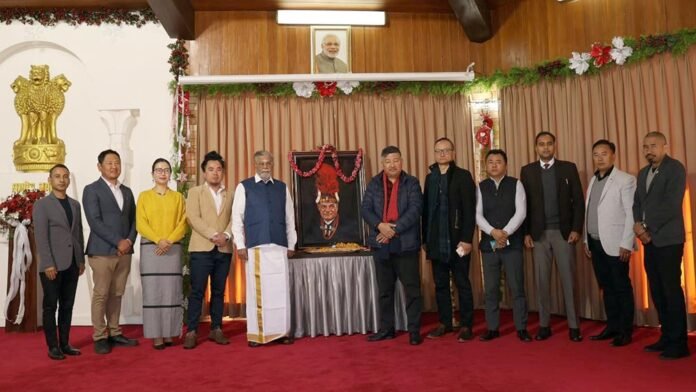In a solemn tribute to one of India’s revered statesmen, the birth anniversary of former Prime Minister Atal Bihari Vajpayee was commemorated in Kohima, Nagaland. The event, held with reverence and admiration, saw dignitaries and citizens alike coming together to honor the legacy of the charismatic leader.
The commemoration kicked off with a floral tribute at a specially adorned portrait of Atal Bihari Vajpayee. Attendees, including government officials, locals, and members of various organizations, paid their respects to the late statesman, acknowledging his contributions to the nation.
A series of speeches were delivered during the event, recounting Vajpayee’s indelible mark on Indian politics. His tenure as Prime Minister was highlighted, focusing on his statesmanship, inclusive policies, and efforts towards fostering national unity. The speakers praised Vajpayee for his visionary leadership, which transcended political lines and left an enduring impact on the country.
The event wasn’t merely a commemoration but an opportunity to reflect on Vajpayee’s principles and values that continue to guide the nation. Participants discussed his unwavering commitment to democratic ideals, economic reforms, and his role in shaping India’s foreign policy.
More About It
Cultural performances infused the event with a sense of vibrancy, reflecting the diversity and richness of India’s cultural heritage. Moreover, dancers and musicians took the stage, captivating the audience with performances that celebrated the spirit of unity and inclusivity, ideals that were integral to Vajpayee’s vision for the nation.
The commemoration in Kohima echoed similar events held across the country to mark Vajpayee Jayanti. Further, it served as a reminder of the statesman’s ability to transcend regional and cultural boundaries, earning him admiration and respect from all corners of the nation.
Nagaland, known for its cultural diversity, added a unique touch to the event by incorporating local elements into the commemoration. Also, traditional Naga attire, music, and dance further emphasized the harmony between national and regional identities, echoing the ethos that Vajpayee championed throughout his political career.
As the event concluded, the sentiment among the participants was one of collective remembrance and appreciation for a leader who left an indelible mark on the nation. The commemoration in Kohima was not just a tribute to Atal Bihari Vajpayee but a celebration of the enduring values and principles that he embodied, fostering a sense of unity and shared purpose among the people of Nagaland and the wider Indian community.


